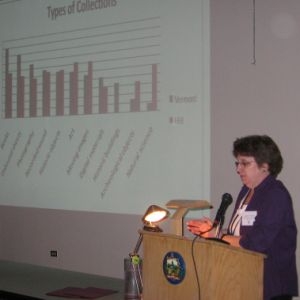 (Host) Vermont’s historic and cultural heritage is at risk.
(Host) Vermont’s historic and cultural heritage is at risk.
That’s the conclusion of an extensive survey conducted by the Vermont Historical Society.
The study found that historic collections are often maintained by poorly funded, volunteer organizations. As a result, valuable records and artifacts are not properly protected and are in danger of damage, theft or loss.
VPR’s John Dillon reports:
(Dillon) Brian Lindner of the Waterbury Historical Society had a cautionary tale for the audience gathered at the Vermont Historical Society.
Waterbury was the home of Dr. Henry Jane, a prominent Civil War surgeon. Dr. Jane’s house is now the Waterbury library – and the building was stuffed full of historic documents and artifacts.
A number of years ago, Lindner recalled, a young man appeared at the library and volunteered to inventory the collection.
(Lindner) "Yeah, he was inventorying Waterbury Historical Society’s collection. But then he was taking it down to this antique store and selling them. And he kept an inventory that we have a copy of: Dr. Jane’s spurs, $350, Dr. Jane’s revolvers, $500, Dr. Jane’s sword, $300. And that’s pretty much how Dr. Jane’s collection disappeared."
(Dillon) Lindner said many paper records remain in Waterbury – and they could prove invaluable to Civil War historians. Dr. Lane was the head surgeon for the Union Army after the battle of Gettysburg, for example, and he kept patient cards that list the names of soldiers and the wounds they suffered.
Lindner found many of the cards stashed in an attic crawl space. But like other volunteer historical societies around Vermont, the Waterbury group hasn’t had the time or money to fully document and preserve the records.
(Lindner) "Ultimately we want to get all of this stuff on to a database and make it available to researchers. I suspect that other historical societies around this state and the country have collections just like this that we don’t know about."
(Dillon) Waterbury’s story may be an extreme example. But the state Historical Society survey found that collections all around the state are in trouble. The society sent a detailed questionnaire to museums, town clerks, historical societies and probate courts.
The survey found that collections are at risk from improper storage – light, water, humidity and heat can all damage records. And many of the historical societies have also lost the intellectual thread that puts the records in context.
That’s because many records and collections aren’t even catalogued. Society Curator Jackie Calder outlined the findings of the survey.
(Calder) "Without a written catalog, long term physical and intellectual accessibility to collections by the public is not possible. What is lost, particularly in museums and historical societies, are the individual stories associated with unique objects."
(Dillon) Calder said in an interview that she hopes communities accept the responsibility for the history that they hold.
(Calder) "These items have been given to the community that has supported them. But they need to understand that there’s a certain amount of work that goes with taking care of them. But a lot of time they don’t see that, that’s not part of the public programming."
(Dillon) The society survey also found that almost 70 percent of the institutions don’t have an emergency plan to protect their collections in the case of a natural disaster.
Protecting the collections will take money. And volunteers were told that federal block grants may be available to help pay for the work.
For VPR News, I’m John Dillon in Montpelier.